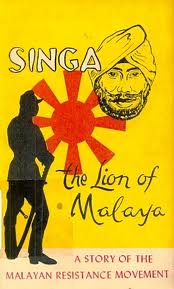Leslie Andres@www.nst.com.my
UNLIKELY HERO: The cop silently waged a battle against the Japanese during World War 2
 EXACTLY 71 years ago yesterday, Malaya was invaded by the Japanese Imperial Army. It didn’t take them long to travel from the northern reaches of the Peninsula to Singapore, where the remnants of the Allied forces eventually surrendered on February 15, 1942.
EXACTLY 71 years ago yesterday, Malaya was invaded by the Japanese Imperial Army. It didn’t take them long to travel from the northern reaches of the Peninsula to Singapore, where the remnants of the Allied forces eventually surrendered on February 15, 1942.
Thousands were killed fighting the Japanese Imperial Army, and once the attack was complete, many also lost their lives in the more than three-year Occupation.
But the war was far from over in Malaya. Members of the Allied forces remained behind to sabotage the Japanese occupiers, and they were joined by rebel groups such as the Malayan People’s Anti-Japanese Army.
Then, too, there were civilians who took part in acts of sabotage or even mere defiance, many of whose deeds or names will never be known .One such person, whose name will likely not be known among the younger generation, especially, is Gurchan Singh, nicknamed the Lion of Malaya.
Gurchan was a policeman before the war and was in charge of Japanese nationals who were interned here. His fair treatment of them proved to be useful during the Occupation as he was considered above suspicion by the Kempetai, the dreaded Japanese military police.
Outwardly friendly to the Japanese, Gurchan was actually dead against the Occupation. Together with his brothers, Gurchan began a secret organisation printing communiques with war news from around the world. It proved to be invaluable as the people were not allowed to listen to foreign news stations and Japanese news was filled with mere propaganda.
The communiques were signed Singa — hence the nickname, which was also a play against the moniker Tiger of Malaya, given to General Tomoyuki Yamashita, the man who came up with the plans for the invasion of Malaya — and created a sensation among the information-starved and depressed people.
Gurchan built up a nationwide network of agents as Singa, none of whom knew that it was he and his brothers who were coming up with the daily communiques.
They believed him to be a mere agent of British spies operating in the jungles, though perhaps some began to suspect something later on.In fact, the Kempetai believed the Singa communiques to be the work of Chinese gangs working hand-in-glove with British spies operating in the jungles.
At least one of Singa’s agents was executed by the Japanese after he was caught with communiques, but he protected Gurchan by not revealing that it was the former policeman who was passing him the communiques. Several others were also tortured but kept mum and were later released.
Towards the end of Singa’s “reign”, Gurchan came up with two communiques which predicted bombings in Kuala Lumpur. They were meant merely to get people to stay away from work to disrupt the Japanese administration, but providence led to British bombers actually unloading their ordnance where Gurchan predicted they would fall.
Gurchan and his brothers did more than just produce the communiques, however. They also carried out acts of sabotage, cutting telecommunication lines and even attacking Japanese soldiers with grenades. Gurchan also recruited agents such as John Sandasamy, who helped sabotage trains, causing an untold amount of damage and delay in the transportation of war materials to Burma, where the warfront was at the time.
Inevitably, however, Singa’s run came to an end. One of his agents revealed to the Kempetai the name of the person who had been passing him the communiques. Gurchan, however, managed to escape when the Kempetai came to arrest him at his Lake Gardens house, took off his turban, cut his hair, shaved off his beard and eventually joined the infamous Death Railway workforce under an assumed name.
Gurchan and several agents had planned to cross the battle lines into Allied-held territory in Burma, but the war ended before they could do so. On his return to Kuala Lumpur, he resumed his career in the Police force and ended up the principal security officer and bodyguard of Tunku Abdul Rahman. He died in an accident in Johor in 1965 while on official business for the then Prime Minister.
Gurchan was famous during his time, and he was one of the people read about in a textbook named Heroes of Malaya, widely used in schools in the 1950s. Yet his name, like so many of the heroes our country has produced over the years, has faded now.
The younger generation, and those who have yet to come, need to be reminded of these heroes. They need to know about those whose sacrifices made us the nation we are today, without whom what we enjoy now would never have come about.



No comments:
Post a Comment
Note: Only a member of this blog may post a comment.